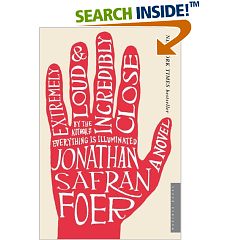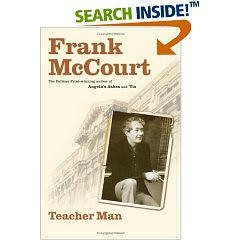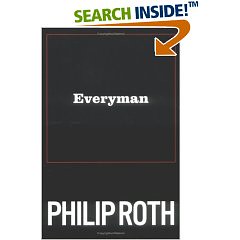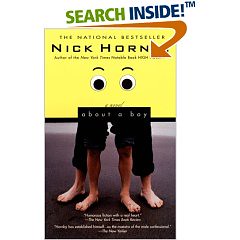Book Report
I can't believe the Crocodile Hunter is dead. And I'm right in the middle of this book about Australia, and I had just last night read this passage:
Nearly every day, it seemed, the papers had a story of arresting improbability under a Queensland dateline.
Alan nodded in accord. "There's a reason for that, of course."
"What's that?"
"They're crazy in Queensland. Madder than cut snakes. You'll like it up there."
...
At the airport he jumped out of the car and helped me haul my bag out of the trunk and said his farewells. He shook my hand. "And remember what I said about watching yourself up north," he said.
"Madder than cut snakes," I repeated, to show that I had been listening.
"Madder than a sack of them."
So thinking about that reminded me that I hadn't ever given you the last installment of my book report. Hope you find something here that interests you.
 One look at the cover of Extremely Loud & Incredibly Close by Jonathan Safran Foer and I recognized right away that it's written by the same guy who wrote Everything is Illuminated, another book that I found it impossible to get through. I can't remember why I couldn't read it, I just remember that I couldn't get past the first chapter. But this one is written in the stream-of-consciousness of a 9-year-old boy who lost his father in the 9/11 attacks in NY. Oskar Schell is a self-confessed "inventor, jewelry designer, jewelry fabricator, amateur entomologist, francophile, vegan, origamist, pacifist, percussionist, amateur astronomer, computer consultant, amateur archeologist, collector of: rare coins, butterflies that died natural deaths, miniature cacti, Beatles memorabilia, semiprecious stones, and other things." He finds a key inside a vase in his dad's closet and undertakes a secret search throughout the buroughs to find the lock that matches the key. I thought Oskar was charming and sweet.
One look at the cover of Extremely Loud & Incredibly Close by Jonathan Safran Foer and I recognized right away that it's written by the same guy who wrote Everything is Illuminated, another book that I found it impossible to get through. I can't remember why I couldn't read it, I just remember that I couldn't get past the first chapter. But this one is written in the stream-of-consciousness of a 9-year-old boy who lost his father in the 9/11 attacks in NY. Oskar Schell is a self-confessed "inventor, jewelry designer, jewelry fabricator, amateur entomologist, francophile, vegan, origamist, pacifist, percussionist, amateur astronomer, computer consultant, amateur archeologist, collector of: rare coins, butterflies that died natural deaths, miniature cacti, Beatles memorabilia, semiprecious stones, and other things." He finds a key inside a vase in his dad's closet and undertakes a secret search throughout the buroughs to find the lock that matches the key. I thought Oskar was charming and sweet.
Teacher Man by Frank McCourt is his follow-up to Angela's Ashes and 'Tis. He says in the prologue that he wrote 'Tis about his life in America and how he became a teacher, but after it was published he had the nagging feeling that he'd given teaching short shrift. So he wrote Teacher Man about teaching English and creative writing in NYC schools. McCourt is such an easy writer to read (as long as you don't try to read it with an Irish brogue, which will slow you down a bit). This selection from page 246 will explain the appeal of this book: "Dreaming, wishing, planning: it's all writing, but the difference between you and the man on the street is that you are looking at it, friends, getting it set in your head, realizing the significance of the insignificant, getting it on paper. You might be in the throes of love or grief, but you are ruthless in observation. You are your material. You are writers and one thing is certain: no matter what happens on Saturday night, or any other night, you'll never be bored again. Never. Nothing human in alien to you. Hold your applause and pass up your homework."

I checked out Everyman by Philip Roth because after reading Gatsby last month I thought it would be good practice to read at least one classic author each time. I'm not sure Roth qualifies as a "classic author" but I thought well, one book that delves into the human condition. But don't all the books I read attempt, on some level, to do that? Anyway. I think you know what I mean. This is the story of a man who gets old and dies. The end. Philosophical. Short. Absolutely nothing out of the ordinary in this man's life. Thus, the title. Actually, there's something much deeper going on here: Everyman can be seen as a bid to engage conclusively with the core anxieties that the literary novel exists to confront: How, absent the shadow of God, in new and confusing brightness, shall we decide what we are, how we human animals should judge ourselves and whether we can love our species despite everything? Okay, I copied and pasted that from Amazon.com. I have no idea what it means really.
 Eleanor Rigby by Douglas Coupland is the story of a lonely woman - as she reminds us about 16 times per page - who is home for a week recuperating from having her wisdom teeth removed, when she gets a call from the hospital. She's listed as the next-of-kin contact on someone she's never heard of. Turns out he's the grown child hat she'd given up for adoption when she was 16. The book is a little disjointed and it takes some really odd turns (like when she takes her lucky meteor with her to Germany and shuts down the entire airport). And the end was so improbable it was completely predictable. Still, overall not a bad read.
Eleanor Rigby by Douglas Coupland is the story of a lonely woman - as she reminds us about 16 times per page - who is home for a week recuperating from having her wisdom teeth removed, when she gets a call from the hospital. She's listed as the next-of-kin contact on someone she's never heard of. Turns out he's the grown child hat she'd given up for adoption when she was 16. The book is a little disjointed and it takes some really odd turns (like when she takes her lucky meteor with her to Germany and shuts down the entire airport). And the end was so improbable it was completely predictable. Still, overall not a bad read.
About a Boy is my latest love affair with Nick Hornby. I don't know what I'll do when I've read all his books and I think Fever Pitch is the only one left. *Sigh* Many of you, like me, have probably seen the movie starring Hugh Grant which was charming, but Hornby's writing is so witty and insightful and unforgettable.

Did you find that you could identify with the character in douglas coupland's book? ;) just teasing.
Posted by Vanessa |
12:52 AM
Vanessa |
12:52 AM